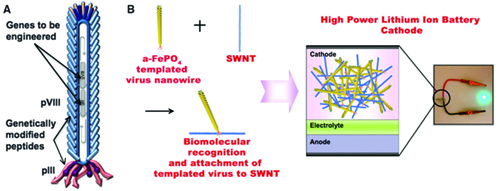 Professor Belcher previously engineered viruses that could build an anode by coating themselves with cobalt oxide and gold and self-assembling to form a nanowire.
Professor Belcher previously engineered viruses that could build an anode by coating themselves with cobalt oxide and gold and self-assembling to form a nanowire.
In the new work, the research team created a cathode to pair with the anode: they genetically engineered viruses that first coat themselves with iron phosphate, then attach to carbon nanotubes to create a highly conductive material.
Though the prototype is the size of a coin cell battery, the researchers believe that they will be able to quickly produce the next generation prototype, using higher voltage materials such as manganese phosphate and nickel phosphate. The resulting commercial batteries would be lightweight, flexible, and conformable to their containers. Most importantly, these virus-built batteries would have high-energy capacity and power performance, and could be manufactured cheaply through a non-toxic process.